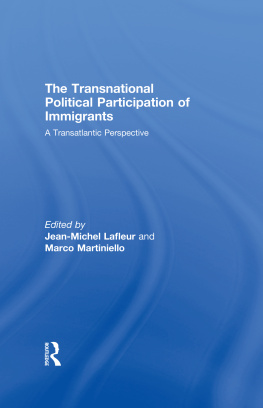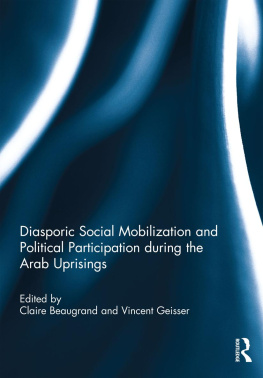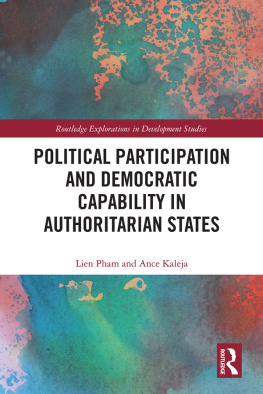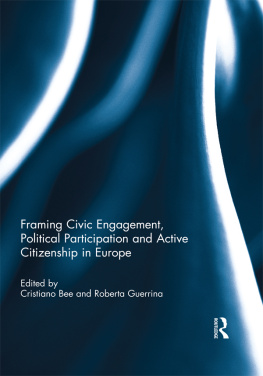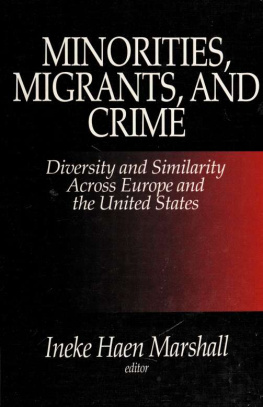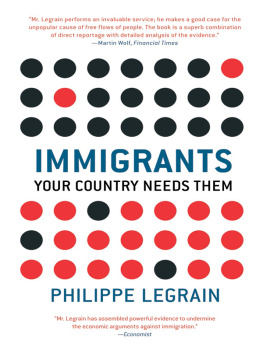The Transnational Political Participation of Immigrants
With the progress in communication and transport technologies, it has never been easier for migrants to stay connected with their country of origin. Facing the wide range of activities in which immigrants are involved, governments in the country of origin and the country of destination have endeavoured to respond to these activities. Up until now, the question of the nature of political engagement across borders that migrants may pursue has yet to be studied in a broad sense.
The purpose of this book is to establish to what extent the place in which immigrants settle (namely the region or country) might determine the types of political activity in which they engage. More precisely, we aim to ascertain whether and for what reasons different forms of transnational political activity develop in the United States and Europe.
To achieve this rather ambitious goal, through looking at a series of case studies from Europe and the USA, we try to identify the full range of such activities, while at the same time noting various similarities in the actions undertaken by communities based in the same area.
With contributions from international experts, this insightful book will be of interest to postgraduates in the field of international politics, migration researchers, political scientists and policymakers.
This book was originally published as a special issue of Ethnic and Racial Studies .
Jean-Michel Lafleur is FRS-FNRS (Belgian National Fund for Scientific Research) Postdoctoral Researcher at the Center for Ethnic and Migration Studies (CEDEM) of the University of Lige.
Marco Martiniello is FRS-FNRS Research Director and Director of the Center for Ethnic and Migration Studies (CEDEM) of the University of Lige. He is also Professor at the University of Lige.
The Transnational Political
Participation of Immigrants
A Transatlantic Perspective
Edited by Jean-Michel Lafleur and Marco
Martiniello
First published 2009 by Routledge
2 Park Square, Milton Park, Abingdon, Oxon, OX14 4RN
Simultaneously published in the USA and Canada
by Routledge
270 Madison Avenue, New York, NY 10016
Routledge is an imprint of the Taylor & Francis Group, an informa business
2009 Edited by Jean-Michel Lafleur and Marco Martiniello
Typeset in Times by Value Chain, India
Printed and bound in Great Britain by CPI Antony Rowe, Chippenham, Wiltshire
All rights reserved. No part of this book may be reprinted or reproduced or utilised in any form or by any electronic, mechanical, or other means, now known or hereafter invented, including photocopying and recording, or in any information storage or retrieval system, without permission in writing from the publishers.
British Library Cataloguing in Publication Data
A catalogue record for this book is available from the British Library
ISBN10: 0-415-48202-X
ISBN13: 978-0-415-48202-8
Contents
| 1 | Jean-Michel Lafleur and Marco Martiniello |
|
| 2 | Jos Itzigsohn and Daniela Villacrs |
|
| 3 | Michael Collyer |
|
| 4 | Robert Courtney Smith |
|
| 5 | Simon Turner |
|
| 6 | Peggy Levitt |
| 7 | Antoine Dumont |
|
MICHAEL COLLYER is Lecturer in Human Geography at the University of Sussex.
ANTOINE DUMONT , is a member of Migrinter International Migrations Spaces & Territories (CNRS University of Poitiers).
JOS ITZIGSOHN is Associate Professor of Sociology at Brown University.
JEAN-MICHEL LAFLEUR is FRS-FNRS (Belgian National Fund for Scientific Research) Postdoctoral Researcher at the Center for Ethnic and Migration Studies (CEDEM) of the University of Lige.
PEGGY LEVITT is Associate Professor at Wellesley College and Co-Director of the Transnational Studies Initiative at Harvard University.
MARCO MARTINIELLO is FRS-FNRS Research Director and Director of the Center for Ethnic and Migration Studies (CEDEM) of the University of Lige. He is also Professor at the University of Lige.
ROBERT COURTNEY SMITH is Associate Professor of Sociology, Immigration Studies and Public Affairs, at Baruch College and the Graduate Center, Sociology, CUNY. He is also co-founder of the Mexican Educational Foundation of New York.
SIMON TURNER is Senior Researcher and Head of the Research Unit Migration Development, Management and Conflict at the Danish Institute for International Studies, Copenhagen, Denmark.
DANIELA VILLACRS is a graduate student at the Brown Sociology Program.
Jean-Michel Lafleur and Marco Martiniello
The political involvement of migrants in their country of origin, combined with the governments of sending countries reciprocal intervention in the political activities of migrants in the receiving
The underlying challenge of this collective effort is thus to demonstrate the usefulness of a transatlantic dialogue and transatlantic comparisons in the study of immigrant political transnation-alism. Before trying to argue in favour of such an exercise, however, it is necessary to question the value of making comparisons between the USA and Europe in the first place. Despite it having become fashionable in the past decade, does it really make sense to compare US and European experiences in this area given the huge historical and present-day differences between these two parts of the world? First, the USA is nowadays often presented as a nation of immigrants, as a nation-state built by immigrants even though this was not always the case in the past (Zolberg 2006). But Europe, on the other hand, while undoubtedly a de facto immigration continent (Thra nhardt 1992; Martiniello 2007), is seen as a non-state (Wiener 1998) formed by different nations built before the large-scale immigration that was basically unwanted as a permanent component of the nation. Second, the historical racial divide originating in slavery between black and white, which continues to play a major role in debates and policies in the USA, finds no equivalent fracture in Europe.
This is not of course to say that racism does not exist in Europe, but that the heritage of slavery plays differently in current debates on immigration, ethnicity and race on each side of the Atlantic. Third, the European continent hosts several former colonial and imperial powers, while the USA is a former colony that has progressively become an imperial power. Fourth, the role of religion in both societies seems quite different. Whereas many European countries became more secularized in the twentieth century, the USA seems to remain globally a more religious country. Fifth, Europe, at least the older member states of the EU, is characterized by a relatively strong welfare state, though there is some debate about its future, whereas the social safety net remains less protective in the USA and this difference is relevant in the context of debates on immigration. Sixth, NAFTA and the EU are very different integration processes and, for the purposes of this book, we regard the difference in terms of freedom of circulation and movement of people as well. Finally, national unity is not a political issue in the USA, whereas in Europe unity of member states is regularly questioned, especially by ultra nationalist and separatist forces in several of its member states (like, for example, Belgium, Italy and Spain).

